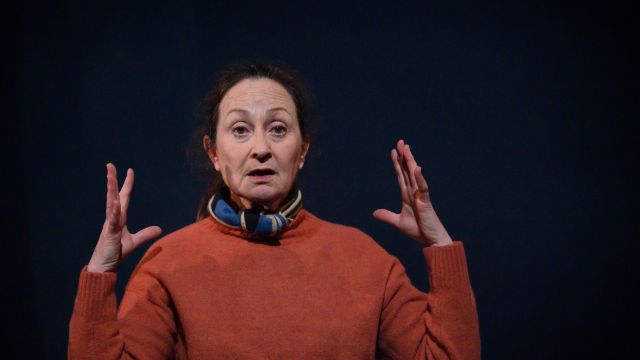June
June (Caroline Lee) has been silent for over a year. Now she has decided to speak – to us, the audience. She asks us to understand. By the end of the play, we will. June is an ‘ordinary woman’, middle-aged, in frumpy clothes, hair pulled back in a ponytail. Married, two children. Now an isolate who chose silence.
In this one-woman show, a monologue, Caroline Lee shows yet again her astonishing range. To take just two recent examples of that range: the manipulative and spooky Witchy Witch in Shhh and the good time gal and Mum, Dot, in Wittenoom. And yet there is always a distinctive almost ethereal alien feel to Lee’s performances – as if she might be from somewhere else, some other dimension. That quality pulls us into her characters, makes us pay close attention to them, and here feeds into and amplifies Patrick McCarthy’s text and his character, June.

One can see why director Emily Tomlins was drawn to this material. After her own extraordinary performances in the so-called ‘Grief Trilogy’ (at La Mama), June is almost a companion piece. The Trilogy plays go deeply into their female characters’ tragic losses – each sharply different - and the pain and difficulty they have of even articulating them. Each time in those plays the women’s stories are told unwillingly, not even fully understood, to strangers, met by chance, at random. Here, we are the strangers.
June tells us a story, a story of a woman already alienated, already questioning the usefulness of talking, already doubting her everyday reality – until a decisive act leaves her – by choice - isolated, ambivalent and understanding her everyday reality in new ways – that make her not happy, not sad, just… outside.
The text is often poetic – although Lee makes it sound completely natural. The risk there is of the tale drifting into abstraction, into the general observation, but it has also vivid images that demonstrate the power of the specific in this kind of storytelling, while never descending into banality.
For me these images, created in our minds, are the powerful elements in the piece – as well as a truly beautiful and moving sequence in which June dances without words. The movements are simple, but they suggest a defiance of sadness in a way that is doubly sad.
The Theatre Works space may not be the ideal venue for this intimate, confessional text, but Tomlins and her lighting designer Lisa Mibus make very good use of it. Mibus’ lighting is intricate, constantly changing, but in sync with the text as is Tomlins’ blocking. At times Lee is way upstage, almost disappearing in gloom as June picks over the past, or she is picked out in sudden side lighting only of her face. At other times, June comes forward, right downstage, into brighter light to confide in us directly with an insight or reassurance. It’s extraordinary how we are relieved when this happens – because we felt we may have lost her.

Although Lee uses designer Zoe Rouse’ three white platforms, they do seem there more to break up the deep space bordered by floor to ceiling curtains and a flower bed rather than serving the text and performance. But at Theatre Works, it is a big empty space and there is just one performer, so…
I saw June on its second night. There were ten people in the audience, including the director. I can only guess a tale of a woman’s grief and silence are not a draw in these times. Okay, June is not a feel-good show. It’s not robust Aussie humour. Its humour is dry and ironic. But McCarthy’s text is evocative and insightful, and Caroline Lee’s performance is modulated, nuanced, exquisitely detailed and truthful. Her varied pace, the light and shade in her delivery, and her use of silence all show her years of experience. This fine show deserves an audience. Go see it, please.
Michael Brindley
Subscribe to our E-Newsletter, buy our latest print edition or find a Performing Arts book at Book Nook.

